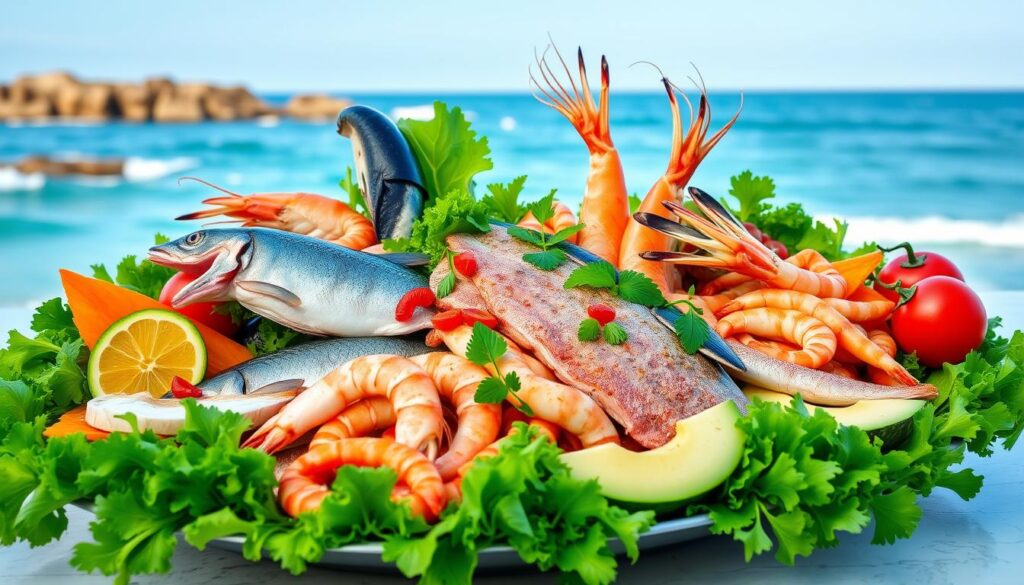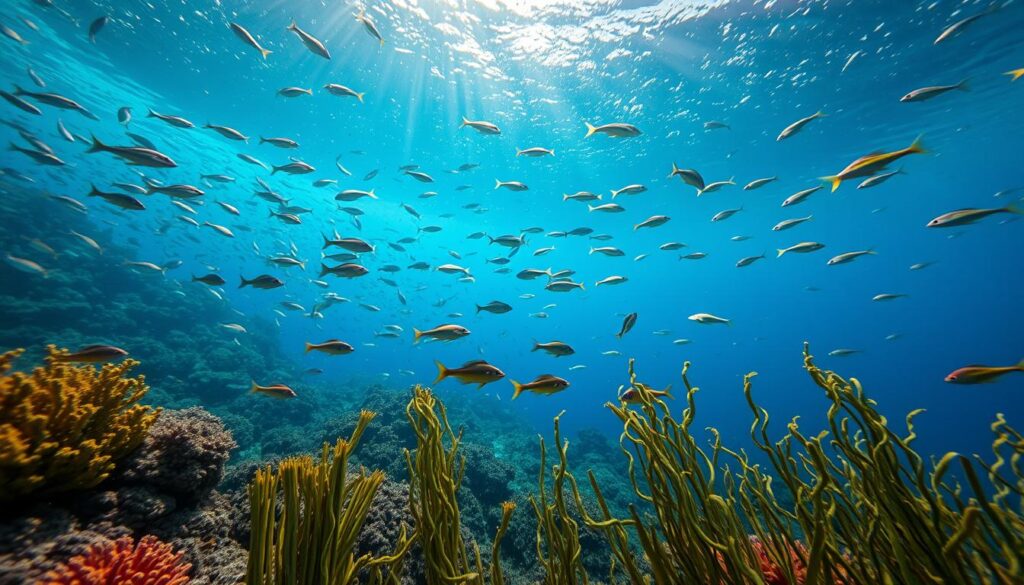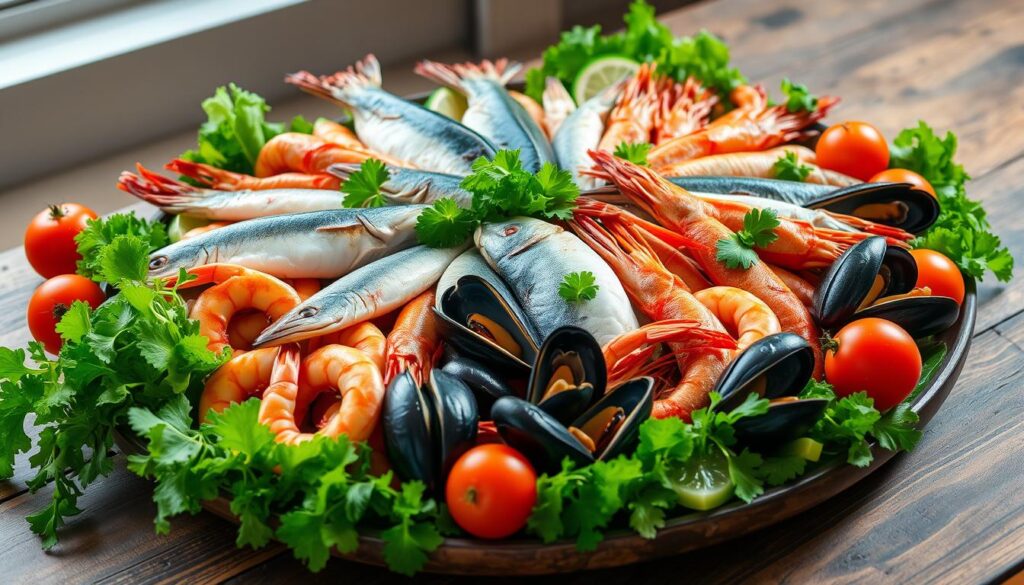Are you curious about the pescatarian diet and its health and environmental benefits? You’re in the right place! This guide explores fish-based eating, its origins, and key principles. It also highlights the many advantages it offers. Get ready for a delicious and sustainable food journey that could change how you eat.
Key Takeaways
- Discover the fundamental aspects of the pescatarian diet and how it differs from other dietary approaches.
- Explore the health benefits associated with a pescatarian lifestyle, from heart health to weight management.
- Understand the importance of sustainable seafood choices and how to navigate mercury levels.
- Uncover practical tips for meal planning, recipe inspiration, and overcoming common challenges as a pescatarian.
Learn about the essential foods to include in your pescatarian diet plan, from diverse seafood options to plant-based staples.
What Is a Pescatarian Diet: Understanding the Basics
Let’s dive into the world of pescetarianism. It’s a diet that includes seafood and plants. Unlike vegans or vegetarians, pescatarians eat fish and shellfish too. This makes it a great choice for those looking for a balanced diet.
Origins and Evolution of Pescetarianism
The pescatarian diet comes from the Mediterranean and Japanese cuisines. Fish and seafood have always been big parts of these diets. Now, it’s popular with people who want to eat well and be kind to the planet.
Key Principles of Fish-Based Eating
- Focus on fish and seafood that’s good for the planet
- Eat lots of fruits, veggies, whole grains, legumes, and healthy fats
- Don’t eat red meat, poultry, or other animal products (except fish and seafood)
- Choose seafood that’s low in mercury and good for the environment
Difference Between Pescatarian and Other Diets
Pescatarians eat fish and seafood, unlike vegetarians and vegans. This gives them more nutrients like omega-3s and vitamins. It also means they can try more foods, making their diet more interesting.

| Diet | Protein Sources | Sustainability |
|---|---|---|
| Pescatarian | Fish, seafood, plant-based foods | Emphasis on sustainable seafood choices |
| Vegetarian | Plant-based foods, dairy, eggs | Avoids animal-based products |
| Vegan | Plant-based foods only | Avoids all animal-based products |
Learning about pescetarianism opens up a world of healthy, tasty eating. Whether you’re new to it or already a fan, it’s a journey filled with flavor and health benefits.
Health Benefits of Following a Pescatarian Diet
Are you curious about the health benefits of a pescatarian diet? Let’s dive into how seafood and plant-based foods can boost your health. We’ll look at heart health, brain function, and more. Discover how this diet can make you feel great!
A pescatarian diet is rich in omega-3 fatty acids. These nutrients, found in fish like salmon, tuna, and mackerel, are key for a healthy heart. Studies show they lower heart disease risk, blood pressure, and improve cholesterol.
This diet also supports brain health and cognitive function. Omega-3s in seafood improve memory, concentration, and brain health. It’s a great choice for those who want to nourish their mind and body.
The pescatarian diet is also a sustainable protein source. It’s better for the environment than traditional meat production. This aligns with the trend towards eco-friendly food choices.
“Switching to a pescatarian diet has been one of the best decisions I’ve made for my health. I feel more energized, my digestion has improved, and I know I’m making a positive impact on the planet.” – Sarah, Pescatarian Enthusiast
Looking to improve heart health, brain function, or support sustainability? The pescatarian diet might be right for you. It combines seafood and plant-based foods for a healthier lifestyle.

| Health Benefits of Pescatarian Diet | Nutritional Highlights |
|---|---|
|
|
Essential Foods in a Fish-Based Diet Plan
Starting a pescatarian diet means eating lots of fish and seafood, plus plenty of plant-based foods. This mix is key to a balanced, vegetarian seafood diet or plant-based seafood diet.
Types of Fish and Seafood to Include
Fish options are endless. Some top picks for pescatarians include:
- Salmon, rich in omega-3 fatty acids
- Tuna, a versatile and protein-packed option
- Shrimp, a low-calorie source of lean protein
- Sardines, brimming with essential vitamins and minerals
- Tilapia, a mild-flavored and budget-friendly fish
Plant-Based Components
Adding plant-based foods is crucial. Make sure to include:
- Leafy greens like spinach and kale
- Legumes such as lentils and chickpeas
- Whole grains like quinoa and brown rice
- Nuts and seeds for added crunch and healthy fats
- Colorful fruits and vegetables for a vitamin and mineral boost
Recommended Portion Sizes
For a balanced diet, watch your portion sizes. Here’s a simple guide:
- Aim for 3-4 ounces of cooked fish or seafood per serving
- Fill half your plate with a variety of plant-based foods
- Complement your meal with whole grains and healthy fats
By eating these foods and keeping portion sizes in check, you’ll enjoy a healthy, pescatarian-friendly lifestyle.
Navigating Mercury Levels and Sustainable Seafood Choices
We love fish and seafood, but we also care about our health and the planet. That’s why knowing about mercury levels in seafood and choosing ethical seafood is key for us.
Some fish have high mercury levels, but we can make smart choices. Salmon, sardines, and tilapia are safer. They offer great nutrition without the mercury risk.
Choosing sustainable seafood is also vital for us. We want to protect the oceans and marine life for the future. We look for seafood that’s certified as sustainable. This ensures the fish is caught or farmed responsibly.
- Opt for wild-caught fish from well-managed fisheries whenever possible.
- Choose farmed fish that are raised in environmentally responsible aquaculture systems.
- Avoid overfished species and those with high levels of bycatch.
By choosing wisely about mercury levels in seafood and sustainable seafood, we benefit our health and the planet. It’s a win-win for us and the oceans we love.
Nutritional Considerations and Omega-3 Benefits
The pescatarian diet focuses on the nutrients in fish and seafood. These are key sources of essential nutrients that boost our health. Let’s look at the main benefits.
Essential Nutrients in Fish
Omega-3 fatty acids are crucial in the pescatarian diet. They are found in fatty fish like salmon, mackerel, and sardines. These fats are good for the heart and brain.
Fish also offer high-quality protein, vitamins B12 and D, and minerals like selenium and zinc.
Plant-Based Nutrient Sources
- While fish and seafood are key, adding plant-based foods is important. Leafy greens, nuts, seeds, and avocados are rich in vitamins, minerals, and fiber.
- Beans, lentils, and legumes are great for plant-based protein. They complement fish and seafood well.
Supplementation Guidelines
Some people might need supplements for certain nutrients. This is especially true for vitamin B12 and omega-3s. Always talk to a healthcare professional about supplements and the right amounts.
Incorporating a variety of nutrient-dense foods, both from the sea and the land, is the key to a well-balanced pescatarian diet.
Meal Planning and Recipe Ideas
Starting a pescatarian diet doesn’t mean you have to give up taste or variety. There’s a world of tasty, healthy meals out there. Whether you need quick dinners or special dishes for dates, we’ve got you covered. Our tips and recipes will make your pescatarian diet exciting and fulfilling.
Quick and Easy Pescatarian Meals
For busy weeknights, try these easy yet tasty pescatarian recipes:
- Grilled Salmon with Roasted Vegetables: Pair tender salmon with a colorful mix of roasted bell peppers, zucchini, and onions for a balanced meal.
- Shrimp Stir-Fry with Quinoa: Cook juicy shrimp with fresh veggies and serve over quinoa for a filling dish.
- Tuna Avocado Salad Wraps: Make a creamy tuna salad with avocado, cucumber, and lemon. Then, wrap it in lettuce leaves for a fresh lunch.
Impressive Pescatarian Dinner Party Dishes
Want to impress your guests? Try these elegant pescatarian recipes:
- Seared Scallops with Beurre Blanc Sauce: Enjoy tender scallops in a rich white wine and butter sauce for a decadent dish.
- Baked Cod with Lemon-Herb Breadcrumbs: Top a simple cod fillet with a crunchy breadcrumb crust. Serve with roasted potatoes and spinach.
- Grilled Mahi-Mahi with Pineapple Salsa: Grill mahi-mahi and serve it with a zesty pineapple, red onion, and cilantro salsa for a flavorful dish.
For great meal planning, mix the sea’s bounty with colorful, healthy plants. With a bit of creativity and these recipes, you’ll create a tasty and satisfying pescatarian diet.
| Recipe | Prep Time | Cook Time | Servings |
|---|---|---|---|
| Grilled Salmon with Roasted Vegetables | 15 minutes | 30 minutes | 4 |
| Shrimp Stir-Fry with Quinoa | 20 minutes | 25 minutes | 3 |
| Tuna Avocado Salad Wraps | 10 minutes | N/A | 2 |
| Seared Scallops with Beurre Blanc Sauce | 25 minutes | 20 minutes | 4 |
| Baked Cod with Lemon-Herb Breadcrumbs | 15 minutes | 25 minutes | 4 |
| Grilled Mahi-Mahi with Pineapple Salsa | 20 minutes | 25 minutes | 4 |
Eating a pescatarian diet is not only good for your health, but it’s also a delicious and sustainable way to enjoy the bounty of the sea.
Common Challenges and Solutions
Starting a pescatarian lifestyle has its ups and downs. But don’t worry, we’re here to help! We’ll cover everything from eating out to saving money on groceries. Our goal is to make your pescatarian journey smooth and enjoyable.
Dining Out as a Pescatarian
Eating out as a pescatarian can be tricky. But with some planning and smart ordering, you can enjoy great meals. Look for fish and seafood options on menus. And don’t shy away from asking for changes to make a dish pescatarian.
Many restaurants are willing to make special dishes for you. So, don’t be afraid to ask.
Budget-Friendly Shopping Tips
- Choose seasonal and local seafood to save money and support ethical seafood sourcing.
- Consider frozen fish and seafood. They’re often cheaper and just as good as fresh.
- Add plant-based proteins like beans, lentils, and tofu to your meals. They’re good for your wallet and your health.
- Watch for sales and buy non-perishable items like canned tuna and plant-based products in bulk.
Food Storage and Preparation
Keeping your pescatarian diet ingredients fresh is crucial. Good storage and prep can make a big difference. Freeze extra seafood in airtight containers to keep it fresh longer. And choose the right thawing and cooking methods to keep nutrients and texture intact.
With a bit of planning, you can reduce waste and enjoy tasty, healthy meals every day.
“The key to a successful pescatarian lifestyle is finding creative ways to make it work for your lifestyle and budget. With a little effort, you can overcome any challenge and enjoy the many benefits of a fish-based diet.”
Using Food Scan Genius for Pescatarian Shopping
Make pescatarian shopping easier with the Food Scan Genius app! This tool lets you scan barcodes quickly. You get info on allergens, nutrition, and ingredients for your fish-based diet. No more guessing what to buy.
Food Scan Genius makes shopping a breeze. It helps you find products that fit your pescatarian lifestyle. No more confusing labels. It shows you the best choices, from wild-caught salmon to plant-based options.
Upgrade your shopping with Food Scan Genius. It makes finding the right products easy. This app helps you choose healthy, sustainable options. Enjoy a simpler path to a balanced, eco-friendly pescatarian diet.
FAQ
What is a pescatarian diet?
A pescatarian diet mainly focuses on plants but includes fish and seafood. It excludes meat, poultry, and other animal products. Instead, it adds fish, shellfish, and other sea foods to meals.
What are the health benefits of following a pescatarian diet?
A pescatarian diet can improve heart health and brain function. It also boosts omega-3 intake. This diet helps manage weight and lowers the risk of chronic diseases.
What types of fish and seafood should I include in a pescatarian diet?
Choose fatty fish like salmon, mackerel, and sardines. Tuna, shrimp, oysters, mussels, and clams are also good. Vary your seafood to get different nutrients.
How do I manage mercury levels and make sustainable seafood choices as a pescatarian?
Watch out for mercury in fish. Pick low-mercury options like salmon and tilapia. Look for eco-friendly suppliers to ensure your seafood is sustainable.
What plant-based foods should I include in a pescatarian diet?
A balanced pescatarian diet includes fruits, vegetables, whole grains, legumes, nuts, and seeds. These add nutrients, fiber, and antioxidants to seafood benefits.
How can I plan pescatarian meals and find delicious recipes?
Planning pescatarian meals is fun. Mix fish and seafood with plant-based foods for balanced meals. Use online resources and recipe blogs for ideas.
What are some common challenges of being a pescatarian, and how can I overcome them?
Challenges include dining out and budgeting. But, with planning, these are solvable. Find pescatarian restaurants and use affordable seafood. Learn how to store and cook seafood well.
How can the Food Scan Genius app help me with my pescatarian shopping?
The Food Scan Genius app is great for pescatarians. It scans barcodes to show allergens, ingredients, and nutrition. This helps make choices that fit your diet.






7 Comments
Your comment is awaiting moderation.
[…] is the star of this lifestyle. Options like salmon, shrimp, and cod are packed with omega-3 fatty acids, which support heart health and reduce inflammation. These proteins are versatile—grill, bake, or […]
[…] Eating a plant-based diet can be good for your heart. Vegans tend to be thinner and have lower BMIs than non-vegans6. Vegan diets are also better for losing weight than other diets6. They can also help lower blood sugar and improve kidney function in people with type 2 diabetes6. […]
[…] Omega-3 fatty acids, EPA and DHA, are also crucial. They boost brain health and fight inflammation. But, it’s hard to get enough from plants alone. Doctors suggest 200–300 mg daily for good health. […]
[…] keto diet focuses on eating less carbs and more fats. This helps your body enter a state called ketosis. Here are the main […]
[…] tools are great for managing diets or eating healthier. They help you navigate food […]
[…] get protein from plants like legumes, nuts, and grains. It’s key to eat a balanced diet. You might need supplements for protein and other […]
[…] a smarter way to eat healthy with Food Scan Genius – your complete nutrition […]
[…] and dependability of these apps, especially when eating out or traveling. One user said, “The Food Scan Genius app has changed my life. I can buy food without worrying about allergens and find safe options […]